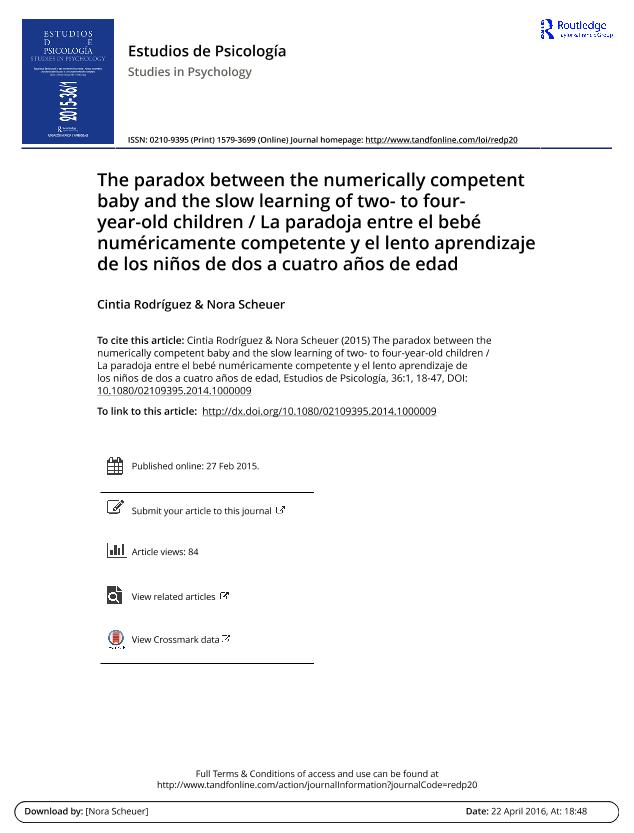Mostrar el registro sencillo del ítem
dc.contributor.author
Rodríguez, Cintia
dc.contributor.author
Scheuer, Nora

dc.date.available
2021-03-03T19:02:23Z
dc.date.issued
2015-02-27
dc.identifier.citation
Rodríguez, Cintia; Scheuer, Nora; The paradox between the numerically competent baby and the slow learning of two- to four-year-old children; Taylor & Francis Ltd; Estudios de Psicologia; 36; 1; 27-2-2015; 18-47
dc.identifier.issn
0210-9395
dc.identifier.uri
http://hdl.handle.net/11336/127335
dc.description.abstract
Since the 1980s, numerous laboratory investigations have been arguing that infants are numerically competent. This work presents a critical review of this line of research. We propose that despite the repertoire of numerical abilities attributed to infants and the seemingly natural character of the very first numbers in the numerical series, the semiotic complexity of their use and comprehension poses a cognitive challenge that children undertake, motivated, supported and often guided by others. This challenge involves a high degree of semiotic organization of the material world as well as an ability to manage early sign systems, systems which children learn how to use during their first years of life and which form the platform on which numbers are based.
dc.description.abstract
A partir de los años 80, numerosas investigaciones de laboratorio defienden que los bebés son numéricamente competentes. En este trabajo proponemos una revisión crítica de esa línea de investigación. Planteamos que pese al repertorio de habilidades numéricas atribuidas a los bebés y al carácter aparentemente natural de los primerísimos números en la serie numérica, usarlos y comprenderlos en su complejidad semiótica supone un desafío cognitivo que los niños emprenden motivados, sostenidos y con frecuencia guiados por otros. Este desafío implica un alto grado de organización semiótica del mundo material, así como un manejo de los primeros sistemas de signos, sistemas de los que los niños se apropian durante los primeros años de vida y que conforman la base sobre la cual se asientan los números.
dc.format
application/pdf
dc.language.iso
eng
dc.publisher
Taylor & Francis Ltd

dc.rights
info:eu-repo/semantics/openAccess
dc.rights.uri
https://creativecommons.org/licenses/by-nc-sa/2.5/ar/
dc.subject
EARLY DEVELOPMENT
dc.subject
NUMBER DEVELOPMENT
dc.subject
OBJECT
dc.subject
SEGMENTATION
dc.subject
SEMIOTIC SYSTEMS
dc.subject.classification
Otras Psicología

dc.subject.classification
Psicología

dc.subject.classification
CIENCIAS SOCIALES

dc.title
The paradox between the numerically competent baby and the slow learning of two- to four-year-old children
dc.title
La paradoja entre el bebé numéricamente competente y el lento aprendizaje de los niños de dos a cuatro años de edad
dc.type
info:eu-repo/semantics/article
dc.type
info:ar-repo/semantics/artículo
dc.type
info:eu-repo/semantics/publishedVersion
dc.date.updated
2021-02-26T19:17:00Z
dc.journal.volume
36
dc.journal.number
1
dc.journal.pagination
18-47
dc.journal.pais
Reino Unido

dc.journal.ciudad
Oxford
dc.description.fil
Fil: Rodríguez, Cintia. Universidad Autónoma de Madrid; España
dc.description.fil
Fil: Scheuer, Nora. Universidad Nacional del Comahue. Centro Regional Universitario Bariloche; Argentina. Consejo Nacional de Investigaciones Científicas y Técnicas. Centro Científico Tecnológico Conicet - Patagonia Norte; Argentina
dc.journal.title
Estudios de Psicologia
dc.relation.alternativeid
info:eu-repo/semantics/altIdentifier/doi/http://dx.doi.org/10.1080/02109395.2014.1000009
dc.relation.alternativeid
info:eu-repo/semantics/altIdentifier/url/https://www.tandfonline.com/doi/abs/10.1080/02109395.2014.1000009
Archivos asociados
